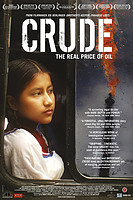 Come see the film that Chevron/Texaco doesn't want you to see about the "Amazonian Chernobyl." To see trailers and read about this award-winning Joe Berlinger documentary film, visit www.crudethemovie.com.&n
Come see the film that Chevron/Texaco doesn't want you to see about the "Amazonian Chernobyl." To see trailers and read about this award-winning Joe Berlinger documentary film, visit www.crudethemovie.com.&n
 Come see the film that Chevron/Texaco doesn't want you to see about the "Amazonian Chernobyl." To see trailers and read about this award-winning Joe Berlinger documentary film, visit www.crudethemovie.com.&n
Come see the film that Chevron/Texaco doesn't want you to see about the "Amazonian Chernobyl." To see trailers and read about this award-winning Joe Berlinger documentary film, visit www.crudethemovie.com.&n
Tropical Rainforest and Native Communities May Never Fully Heal From Three Decades of Carcinogenic Dumping: Online Interviews with Achuar Leaders
On March 15, the United Nations General Assembly voted 170–4 to create a new Human Rights Council, effectively dissolving the oft-criticized Commission on Human Rights. Candidates for the Council will need to be elected by an absolute majority of 96 votes in order to secure a position, and once elected members can serve a maximum of two consecutive terms.
Vancouver-based Ascendant Copper (TSX: ACX) plans to submit the EIS for its Junán copper-molybdenum project in Ecuador to the government and local communities in mid-January, the company reported in a statement.
The study outlines Ascendant's proposed exploration program and how the company plans to adhere to environmental regulations. The EIS will be subject to a 30-day public comment period, after which it will go to Ecuador's mining ministry for consideration.
Global Response is currently involved in two campaigns in Ecuador, where indigenous Shuar, Achuar and Kichwa Sarayacu communities are struggling to protect their territories against multinational oil companies.
The Ecuadorian environmental organization Accion Ecologica supports these and many other campaigns for environmental protection and environmental justice in Ecuador. In May, their office was burglarized, and now they have received death threats.
Achuar Territory, Peru – In January, EarthRights International visited a remote area of the Peruvian Amazon to document the resistance of the Achuar people to oil development by California-based Occidental Petroleum. At an Assembly in the village of Wisum, on the Huitoyacu River, we interviewed, photographed and filmed leaders and members of the Achuar federations of ATI and ORACH, who reiterated unequivocally their official position rejecting oil development in their territory.
BUENOS AIRES, Nov 9 (IPS) - Buenos Aires has unexpectedly become the new stage for a long-standing battle between an Argentine oil company and an Ecuadorian indigenous community fighting to defend its ancestral land rights in the Amazon rainforest.
Representatives of the Kichwa community of Sarayaku have come to the Argentine capital to call on President Néstor Kirchner to intervene in the conflict.
"Our people's future is threatened. We are living in a constant state of fear," Marlon Santi, a community leader from Sarayaku, told IPS.
During a protest at the Coca airport last week, 50 indigenous people from the Siona, Huaorani, Cofan, and Shuar groups demanded that Texaco pay $6 billion to clean up half a million hectares of land polluted by former oil productions. Representatives for Texaco said they had spent $40 million already and did not intend to spend more.
On January 25, the Sarayacu community in the Ecuadorian Amazon declared a state of emergency to defend their territories and stop exploration and exploitation of their lands by the Argentina General Fuel Company (CGS). As part of the declaration, the Sarayacu have created 25 Peace and Life Camps, each comprised of 150 members. The action comes in the wake of President Lucio Gutiérrez’s statement last week that CGS oil projects would continue in the area.
Sarayaku President Marlon Santi met with the Inter-American Commission on Human Rights (IACHR) in Washington to discuss a recent battle between the Sarayaku and the Argentine oil company CGC. CGC has announced plans to drill on traditional land against indigenous wishes but with the complete support of the Ecuadorian Government.
The Sarayacu of Ecuador recently met with the Inter-American Commission on Human Rights (OAS) to present evidence of the Ecuadorian government’s human rights violations. They are accused of not complying with the OAS’s precautionary measures that were enacted to protect the Sarayacu.
ChevronTexaco Oil Company (CGC) will continue seismic operations in Sarayacu territory against the wishes of the Kichwa of Sarayacu. Spokespersons for the Kichwa say that allowing CGC to drill is a violation of their human rights. The Ecuadorian President Lucio Gutierrez supports oil operations on Kichwa land.